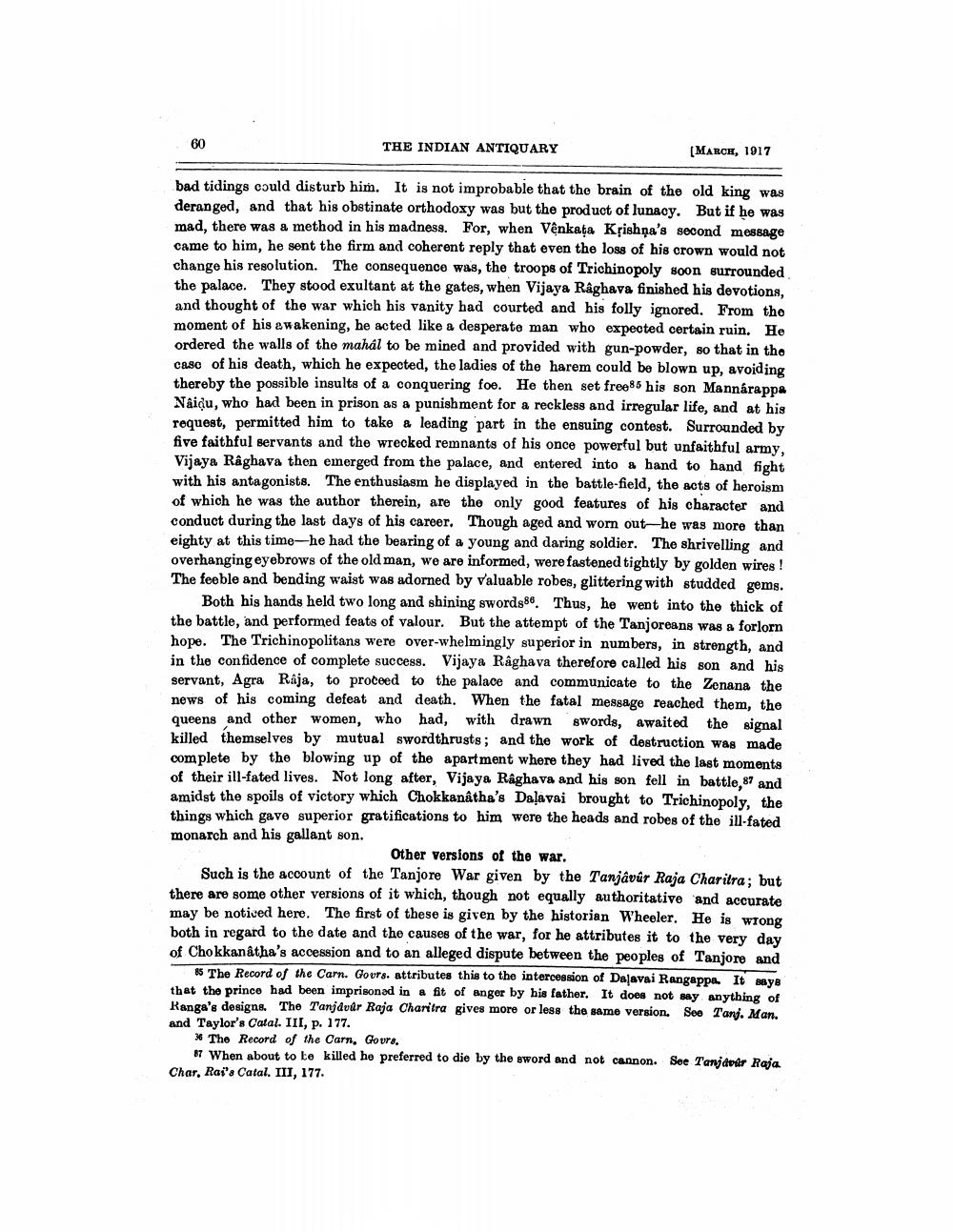________________
60
THE INDIAN ANTIQUARY
[MARCH, 1917
bad tidings could disturb him. It is not improbable that the brain of the old king was deranged, and that his obstinate orthodoxy was but the product of lunacy. But if he was mad, there was a method in his madness. For, when Venkata Krishna's second message came to him, he sent the firm and coherent reply that even the loss of his crown would not change his resolution. The consequence was, the troops of Trichinopoly soon surrounded the palace. They stood exultant at the gates, when Vijaya Raghava finished his devotions, and thought of the war which his vanity had courted and his folly ignored. From the moment of his awakening, he acted like a desperate man who expected certain ruin. He ordered the walls of the mahal to be mined and provided with gun-powder, so that in the case of his death, which he expected, the ladies of the harem could be blown up, avoiding thereby the possible insults of a conquering foe. He then set free85 his son Mannarappa Naidu, who had been in prison as a punishment for a reckless and irregular life, and at his request, permitted him to take a leading part in the ensuing contest. Surrounded by five faithful servants and the wrecked remnants of his once powerful but unfaithful army, Vijaya Raghava then emerged from the palace, and entered into a hand to hand fight with his antagonists. The enthusiasm he displayed in the battle-field, the acts of heroism of which he was the author therein, are the only good features of his character and conduct during the last days of his career. Though aged and worn out he was more than eighty at this time-he had the bearing of a young and daring soldier. The shrivelling and overhanging eyebrows of the old man, we are informed, were fastened tightly by golden wires! The feeble and bending waist was adorned by valuable robes, glittering with studded gems.
Both his hands held two long and shining swords86. Thus, he went into the thick of the battle, and performed feats of valour. But the attempt of the Tanjoreans was a forlorn hope. The Trichinopolitans were over-whelmingly superior in numbers, in strength, and in the confidence of complete success. Vijaya Raghava therefore called his son and his servant, Agra Raja, to proceed to the palace and communicate to the Zenana the news of his coming defeat and death. When the fatal message reached them, the queens and other women, who had, with drawn swords, awaited the signal killed themselves by mutual swordthrusts; and the work of destruction was made complete by the blowing up of the apartment where they had lived the last moments of their ill-fated lives. Not long after, Vijaya Raghava and his son fell in battle,87 and amidst the spoils of victory which Chokkanâtha's Dalavai brought to Trichinopoly, the things which gave superior gratifications to him were the heads and robes of the ill-fated monarch and his gallant son.
Other versions of the war.
Such is the account of the Tanjore War given by the Tanjâvûr Raja Charitra; but there are some other versions of it which, though not equally authoritative and accurate may be noticed here. The first of these is given by the historian Wheeler. He is wrong both in regard to the date and the causes of the war, for he attributes it to the very day of Chokkanâtha's accession and to an alleged dispute between the peoples of Tanjore and
85 The Record of the Carn. Gours. attributes this to the intercession of Daļavai Rangappa. It says that the prince had been imprisoned in a fit of anger by his father. It does not say anything of Ranga's designs. The Tanjavur Raja Charitra gives more or less the same version. See Tanj. Man. and Taylor's Catal. III, p. 177.
36 The Record of the Carn, Gours.
87 When about to be killed he preferred to die by the sword and not cannon. See Tanjavur Raja Char, Rai's Catal. III, 177.




